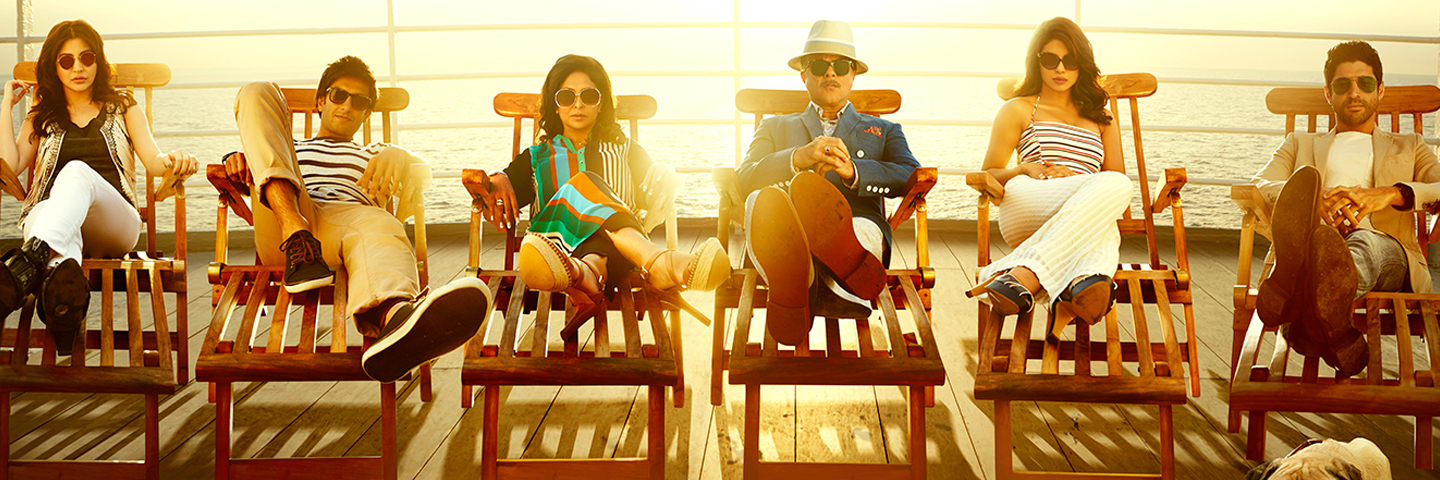Dil Dhadakne Do is a 2015 Indian family drama film directed by Zoya Akhtar and co-produced by Farhan Akhtar and Ritesh Sidhwani. Co- written by Reema Kagti and Zoya Akhtar, Dil Dhadakne Do features a star-studded ensemble cast led by Anil Kapoor, Priyanka Chopra, Ranveer Singh, Anushka Sharma, Rahul Bose, Shefali Shah, and Farhan Akhtar. The movie revolves around an upper class Punjabi family on a cruise trip. The father, Kamal Mehra (Anil Kapoor), is a self-made businessman who is married to Neelam (Shefali Shah), a housewife, and the couple has two children, Ayesha (Priyanka Chopra) who is married to Manav (Rahul Bose) and Kabir (Ranveer Singh) who is a bachelor. The cruise is planned by Ayesha and Kabir to celebrate their parents' 30th marriage anniversary. However, Kamal Mehra is facing bankruptcy, and, being a shrewd businessman, he sees the cruise as an opportunity to revive credibility by selling off 49 percent of his company's stake to a powerful adversary, by hook or by crook. Soon things begin to take an ugly shape as Kamal's ambitions once again come in the way of his children's happiness.
Dil Dhadakne Do is essentially about rich people, their extravagant lives, scandalous affairs, and the problems that surround them. Reema Kagti and Zoya Akhtar must have had the Indian diaspora in their minds while devising the movie's script. Since independence, the Hindi cinema had been instrumental role in highlighting the issues of national importance; time and again, it played a pivotal role in eliciting a strong feeling of patriotism that kept the nation together in the times of need: be it war or natural calamities. But, it all began to change around the 1990s as the Nehruvian socialism made way for liberalization, globalization, and privatization. As the Indian economy slowly opened up, the Hindi cinema began to experience an Anglicization of sorts with the growing influence of the Indian diaspora which is best demonstrated by films like Dilwale Dulhania Le Jayenge, Pardes, Namastey London, etc. Bollywood started catering more and more to the English speaking Indians as oppose to the whole of India as used to be the case earlier. While some recent films have shown a change in this trend, many major production houses are still sticking to the time- tested formula of making films that cater to the Anglophonic tastes of the ever expanding urban middle-class. It can be said with absolute certainty that Dil Dhadakne Do is targeted towards the very class of audience.
Dil Dhadakne Do brings to the fore the issue of marital incompatibility between partners. It's a topic that's seldom been touched upon in Hindi films. Even the modern Indian families haven't yet fully come to terms with the important issue of gender equality. Yes, the women certainly have greater liberty but they still don't enjoy the equality that's associated with the fairer sex in the western societies. For all important matters (like marriage, family planning, work, etc.) the females must seek permission from their fathers/husbands. And then there's this childish fascination for a male heir to take forward the family legacy. Why can't a daughter assume the mantle, if she has both the interest and the qualification? It is questions like these that lie at the heart of Dil Dhadakne Do. The movie also poses some important questions about life: Why we humans despite being gifted with the power of speech fail to propagate our innermost thoughts to the ones we love? Why we spent most of our time doing things that have little relevance to life? Why we allow our ego to come in the way of our love? Why we complicate the lives of ones we love and care about instead of showing them the right path? Most of these questions appear in form of voiceovers, brilliantly delivered by none other than Aamir Khan whose narration is certainly the movie's USP.
?Overall, Dil Dhadakne Do? comes across as a breath of fresh air with a rainbow of touching performances. But, the movie could have been much more than a clichéd melodramatic family affair had the makers given greater importance to storytelling than merely trying to accommodate a stellar ensemble cast in the screenplay. Dil Dhadakne Do can be watched for the performances and the scenic locations (although the movie proves to quite underwhelming even in this department, especially when compared to Zoya Akhtar's Zindagi Na Milegi Dobara). This critic, for one, certainly expects more in the creative department from the able duo of Zoya Akhtar and Reema Kagti. Is in asking for too much? Speaking of performances, the sizzling romance between Ranveer Singh and Anushka Sharma proves to be a major highlight (it's their first outing after a long hiatus following their break up and it has certainly been worth the wait). Also, it's good to see Priyanka Chopra being her a-game to the table. While Farhan Akhtar puts up a rather sedate show during his special appearance, Rahul Bose is solid as ever in the role of a chauvinistic husband. One particular scene between Bose and Chopra wherein the husband-wife duo plays Tennis is both funny and intense— the sequence brilliantly sums up their rather lopsided relationship. Amidst a series of solid performances, it's Shefali Shah's performance of a troubled housewife that stands first among equals. Dil Dhadakne Do certainly lacks a universal appeal, and while it will best be appreciated by the Anglophone urban audience, anyway who is not particularly uninterested in rich people's problems can afford to give it a try.


